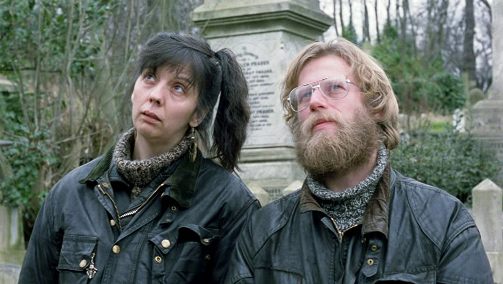 Mike Leigh’s 1988 breakthrough film already contains what makes him great: working class issues, funny believable characters, and a fine sensitivity for the miseries of family life.
Mike Leigh’s 1988 breakthrough film already contains what makes him great: working class issues, funny believable characters, and a fine sensitivity for the miseries of family life.
For decades I’ve been enjoying and writing about the films of English director Mike Leigh: Secrets & Lies, Topsy-Turvy, Vera Drake, these are just a few examples. But it was only recently that I watched his breakthrough film, the movie that essentially brought him to the attention of the world, from 1988: High Hopes. It seems to me that High Hopes provides something of a key to Leigh’s work.
Cyril and Shirley are a leftist working class couple living in London, and getting by on low wage jobs. Cyril, played by Phil Davis, is a Marxist intellectual who’s become embittered about the possibility of change in the era of Margaret Thatcher. Shirley, played by Ruth Sheen, shares his radical orientation, but she is more practical, more positive, and very funny. They are good caring people who sometimes quarrel like most couples. Cyril’s elderly mother, played by Edna Doré, lives in her own flat and seems permanently depressed, her cognitive abilities and energy clearly at a low ebb. Cyril and Shirley try to be helpful to his mom, but she tends to resist help. Cyril’s sister Valerie, played with manic intensity by Heather Tobias, puts on a big show of loving their mom and doing nice things for her, but her constant annoying giggle fails to conceal her unacknowledged rage. She’s married to a cynical and abusive used car salesman, a real creep named Martin, played by Philip Jackson.
These are the five main characters, but there are others with scenes that are funny and significant. The mother’s next-door neighbors become involved when she locks herself out of her flat. These neighbors are hilariously clueless upper class twits played by Lesley Manville and David Bamber. They temporarily take over the film.
One of the things this movie made me realize is that even though Leigh’s characters tend to be “oddballs” and eccentrics, and the minor ones are often outrageous (but funny) caricatures, they all look more like people I know or see in everyday life than the sanitized, superficially flattering versions of ourselves that we see in most films and TV. In Hollywood terms, Ruth Sheen, for instance, looks awkward and ungainly, but she is the one performer in the film that you will remember most of all, because she plays such a genuine good person. After awhile you lose that initial awkward impression and accept her and her pleasant looks like you would real people you might know.
As in many of Leigh’s films, High Hopes is centered on working class issues. The frantic yuppie Valerie and her craven husband represent the emptiness of consumer society, and the upper class twits are utterly self-centered. But the movie doesn’t idealize the central couple. Cyril feels too powerless and disgusted to stay involved in activism. And he rejects Shirley’s desire to have a baby because the world is too corrupt to raise a child in. This conflict between them, which keeps recurring, happens within a real loving relationship, so it doesn’t break them. But it’s poignant. The plight of the elderly mother evokes some deep sadness. Why her life has disappointed her we never learn completely, although there are clues. But Leigh takes the time to present the chaos in her insane family from the old lady’s point of view, and it is tremendously moving.
The writing is witty and thoughtful, and it should be noted that, as in all Leigh’s films, the actors helped write their own dialogue. It’s rare also to see an essentially comic film have an impact as a good domestic drama as well. High Hopes is fresh and raw, maybe not as smooth as some of his later films, but I just love it. It sums up a lot of what I love not only about this director, but about how great film can be.

Fellini’s first film as director, in collaboration with the veteran Alberto Lattuada, was this witty comedy about a small time traveling theater troupe. When...

A lonely little girl is visited by the ghost of her father’s first wife, in a drama about childhood imagination that was marketed as...

A documentary portrait of Ruth Bader Ginsburg reveals the life story of the Supreme Court Justice and her key role in advancing women’s rights...